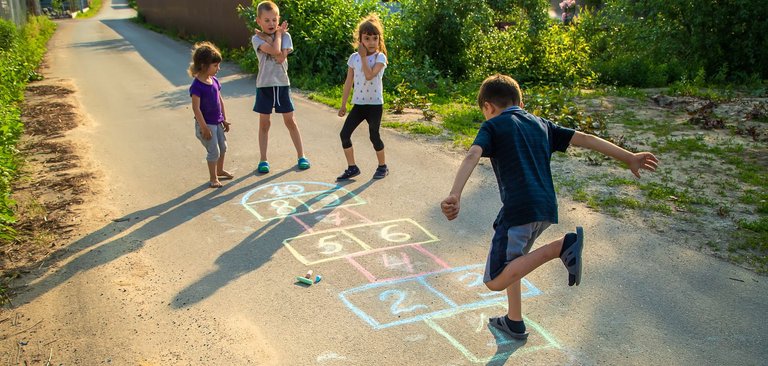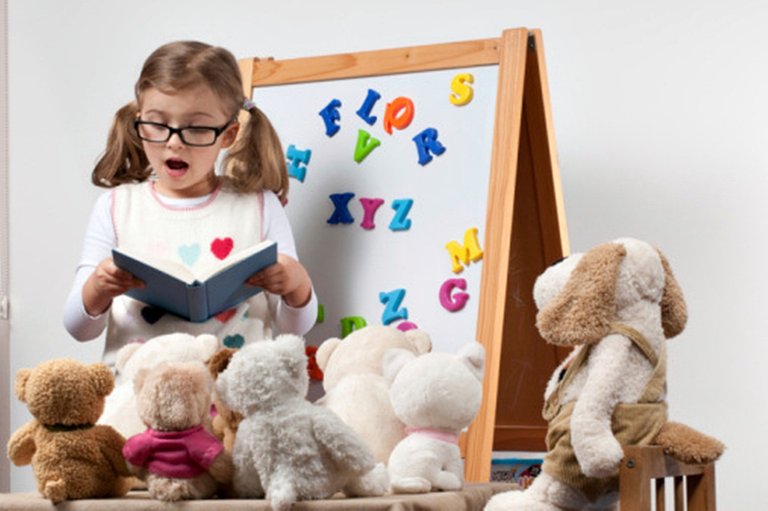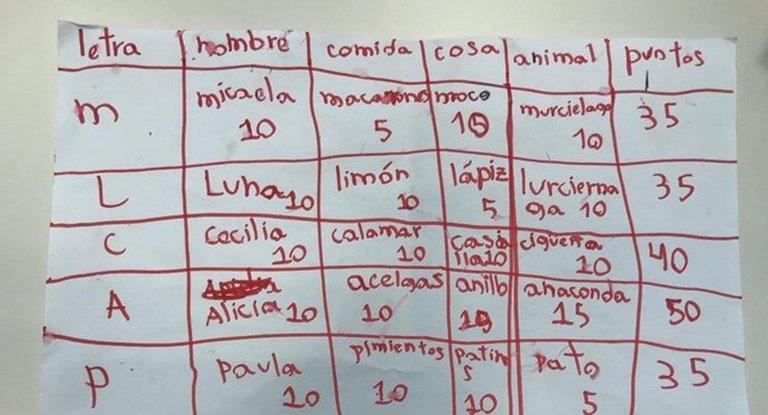
ESPAÑOL
Hola, feliz día a todos. Hoy me uno a la iniciativa más reciente de nuestra columna “Échame el cuento”, que nuestra @brujita18 tituló: ¿Cuál fue tu juego preferido y qué haces hoy día?](https://ecency.com/hive-117341/@brujita18/echame-el-cuento-cual-fue). Este tema no sólo es refrescante por hacernos retornar a nuestra infancia y rememorar nuestros momentos de jugar, sino que nos instruye en el proceso para relacionar nuestros juegos favoritos con nuestra profesión y/o labor actual.
Se sabe que gran parte de nuestra conducta, personalidad y carácter desde la infancia, puede influir en la toma de decisiones de adulto al momento de seleccionar profesiones o estudios profesionales, así como también, labores o emprendimientos. Todo este proceso selectivo va a depender de nuestras capacidades, conocimientos, y habilidades, porque a veces por más que nos esforzamos en desempeñar algo, no encajamos… bien dice un refrán por ahí: “Zapatero a su zapato”.
Yo siempre tuve inclinación hacia tres carreras universitarias; educación, periodismo, y psicología, pero fue la primera la que terminé estudiando y desempeñando por más de 30 años. Si no desarrollamos esta iniciativa, jamás habría reparado en ese detalle en relación con mis juegos de infancia, y haciendo un ligero viaje en el tiempo, me ubico en mis juegos favoritos de aquellos tiempos, y debo aclarar que me gustaban muchos, sobre todo los juegos grupales.

Uno de mis juegos favoritos era el de la maestra, al principio sentaba a mis muñecos y ellos eran mis alumnos, pero al pasar del tiempo, cuando me mudé a un urbanismo con mamá, me convertí en la maestra de mis vecinitos más pequeños, y recuerdo que los sentaba en latas, o bloques, porque no tenía ni sillas ni bancos para armar mi escuelita. Allí los enseñaba a leer, y les hacía caligrafías y dictados, nada más.
Pero el juego que más disfrutaba, y el que podía jugar a diario sin fastidiarme, era “Stop”. Este juego fue posterior a una rutina que mi tía nos ponía siempre en la pizarra, que era el juego del ahorcado, y de esa manera nos iba adiestrando en la agilidad mental para descubrir palabras. Ella también fue docente, y nos cultivó muchísimo la escritura y la cultura general. Cuando ya todos obtuvimos destreza para escribir, llegó el juego de stop, y nos sentaba en la mesa del comedor a jugarlo. Debo confesar que no sólo era emocionante, sino que nos hacía reír por lo tramposos que podían ser algunos para inventar palabras raras.
Ya más grandecitos, jugábamos sin los adultos, y hasta creábamos listas de palabras por cada letra para aprenderlas antes de cada juego. De esa manera aprendimos cualquier cantidad de ciudades, animales, flores y frutos por las letras más complicadas del abecedario. En mi labor como Profesora de Castellano, por mucho tiempo implementé una actividad con este juego, donde les variaba a los alumnos los tipos de palabras por cada letra, y de esta manera fueron aprendiendo a diferenciar sustantivos, verbos, adjetivos, palabras agudas, graves, etc., jugando stop.

Creo que el resto de los juegos que me gustaban, que eran grupales y tradicionales, en cierto modo los reflejé en mi día a día con los niños, ya que una de las metodologías planteadas, era aprender jugando, y los juegos didácticos eran muy efectivos para este proceso.
Espero les guste mi participación, gracias por visitar mi blog y formar parte de nuestra columna. Feliz día.


ENGLISH
Hello, happy day to all. Today I am joining the most recent initiative of our column “Échame el cuento”, which our @brujita18 titled: What was your favorite game and what do you do today. This topic is not only refreshing for taking us back to our childhood and reminiscing about our playful moments, but it also instructs us in the process of relating our favorite games to our current profession and/or job.
It is known that much of our behavior, personality and character since childhood, can influence our adult decision making when selecting professions or professional studies, as well as work or entrepreneurship. All this selective process will depend on our abilities, knowledge and skills, because sometimes no matter how hard we try to perform something, we do not fit in... as the saying goes: “Shoemaker to his own shoe”.
I always had an inclination towards three university careers; education, journalism, and psychology, but it was the first one that I ended up studying and performing for more than 30 years. If we did not develop this initiative, I would never have noticed that detail in relation to my childhood games, and making a slight trip back in time, I place myself in my favorite games of those times, and I must clarify that I liked many, especially group games.

One of my favorite games was that of the teacher, at first I sat my dolls and they were my students, but as time went by, when I moved to a housing development with my mother, I became the teacher of my younger neighbors, and I remember that I sat them on cans, or blocks, because I had no chairs or benches to set up my little school. There I taught them to read, and I did calligraphy and dictation, nothing else.
But the game I enjoyed the most, and the one I could play every day without getting annoyed, was “Stop”. This game followed a routine that my aunt always put on the blackboard, which was the hangman game, and in that way she trained us in the mental agility to discover words. She was also a teacher, and she taught us a lot about writing and general culture. When we were all proficient in writing, the stop game arrived, and she would sit us down at the dining room table to play it. I must confess that it was not only exciting, but it made us laugh because of how tricky some of us could be to invent strange words.
When we were older, we played without the adults, and even created lists of words for each letter to learn before each game. That way we learned any number of cities, animals, flowers and fruits for the most complicated letters of the alphabet. In my work as a Spanish teacher, for a long time I implemented an activity with this game, where I varied the types of words for each letter, and in this way they learned to differentiate nouns, verbs, adjectives, acute words, grave words, etc., playing stop.

I think that the rest of the games that I liked, which were group and traditional, in a way I reflected them in my day to day with the children, since one of the methodologies proposed was to learn by playing, and the didactic games were very effective for this process.
I hope you like my participation, thank you for visiting my blog and being part of our column. Happy day.

IMAGE SOURCES - FUENTES DE IMÁGENES
El juego del stop – Plan Lea
Rayuela - Juntos crecemos
Juegos tradicionales - Escoles
The translator used is: Deepl Translator // El traductor utilizado es: Deepl Translator

Contenido Original del Autor
Aplicaciones: Canva, PhotoScape, Instagram, Inshot y Pixiz.
Traducción: Deepl Traductor www.DeepL.com/Translator
Las imágenes personales son tomadas con un dispositivo móvil Android Redmi 13 Note, de mi propiedad.
Las imágenes utilizadas en los banners, minibanners, gifs y separadores, son cortesía de Pixabay.
Derechos Reservados del Autor: @annafenix (2021 – 2025)
~ ~ ~ ~ ~ ~ ~ ~ ~ ~ ~ ~
Original Author Content
Applications: Canva, PhotoScape, Instagram, Inshot and Pixiz.
Translation: Deepl Translator www.DeepL.com/Translator
Personal images are taken with an Android Redmi 13 Note mobile device, owned by me.
Images used in banners, minibanners, gifs and separators, are courtesy of Pixabay.
© Copyright: @annafenix (2021 - 2025)
